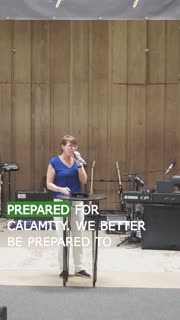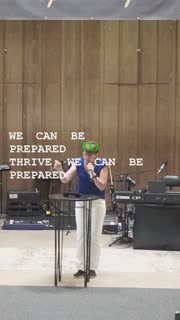Preparing for Challenges: Trusting God's Faithfulness
Devotional
Sermon Summary
Bible Study Guide
Sermon Clips
1. "You know when you encounter the living God, you know that you can hang on them. Storms come, storms come, shaky waters come, but you know when you encounter, with the living God, that he is living, permanent, permanent, everything else is temporary, everything else is permanent in our lives, all we have to do is hang on, all we have is hang on, if you let go, if let go, his hand is still there, his hand is for you to grab, it is within reach, it is reach, it is within reach." [28:08] (39 seconds)
2. "We know that when we create an environment for people to encounter Christ, and when we empower them to advance the kingdom, we can live to be all that God designed them to be, because he designed each and every one of us, and here, everyone of us is amazing, amazing, my daughter, I love you, don't choose anybody, she had a shirt, that my stepmom's shirt, be amazing today, I love that shirt, I love that shirt, I think I kept it." [28:08] (29 seconds)
3. "He designed us, you guys, he is amazing, amazing, he doesn't create he doesn't create royalty, we have special and unique gifts, special and unique gifts that he put inside of us, he put inside of us, because we're amazing, we're amazing, so be amazing, today, so be amazing, today, be amazing, today, you're so generous, God, you're so generous, generous to us, you're so generous through us, you're so generous through us, you give us everything that ever need, and we thank you for it, because you will, we thank you for all of our needs, of course, to your, of our needs, that is what your word says." [29:49] (37 seconds)
4. "Joseph knew where his mind was going to interpret, and his mind was going to interpret all of our gifts and talents and anointings and talents and anointings, it has nothing to do with us, he gives us things, we can be totally anointed, we can be totally anointed, he gives us those things, he gives us practice and become better, practice and become better, right?" [53:49] (19 seconds)
5. "We better be prepared for calamity. We better be prepared to thrive. We better be prepared to thrive, because we can. Because we can. probably should learn how to garden. You probably should learn how to fruit. So, your own food, you might want to learn. You might want to learn roads, so you and your kids. So, you and your kids can get around without a GPS. You might want to have extra gasoline on hand." [01:04:43] (25 seconds)
6. "We can be prepared to thrive. We can be prepared to thrive. We can be prepared to thrive. Shaking is how people thrive. Shaking is how people awaken from their slumber and we cast out apathy of the night. People will awaken... so learning how to garden, can, how to grow your own food could prove very helpful in addition learning how to get our own securos, communication plans, all that stuff, nutrition plans, all that stuff." [01:07:18] (37 seconds)
7. "We don't have to follow the crowd. The church is not meant to follow the crowd. The church is meant to follow the church. There's going to be a lot of people panicking and freaking out. And probably some Christians. Probably some Christians. We don't have to be them. We don't have to be them. We can be cool, calm, and collected. My family is taken care of. My family is taken care of. They're going to be taken care of. They're going to be taken care of." [01:12:51] (27 seconds)
8. "It's our job. Nobody else is going to do it for us. Tomorrow will not come. It's today. It's today. It's today. Start learning. Start planning. Start asking the Lord. Ask the Lord what he would have you do. Ask the Lord what he would have you do. How much food should I set aside, Lord? What kind of food should I set aside, Lord? How do I garden, God? How do I garden, God? What's the one crop to grow in this area?" [01:13:28] (24 seconds)
9. "Because Jesus is alive. Because Jesus is alive. And of all of it. Through all. The only way for us to be beacons. The only way for us to be beacons. The great one. You need to prepare for this. Get ready now. Get ready now. Not tomorrow. Not tomorrow. Now. Be prepared now. If you are investors, consider repositioning your investment." [01:14:19] (20 seconds)
10. "I'm not in fear. I'm fear. I know God will take care of me. I know take care of me. Because I know that we're planning. Because we're preparing. And all of you need to also. And all of you need to also. Watch, this is what it is. It's just as we think this election is going to go off, this election is going to go off. Watch your mind. It's not. People are angry. People are divided. People are angry. People are divided." [01:16:29] (20 seconds)
Ask a question about this sermon
2. "We know that when we create an environment for people to encounter Christ, and when we empower them to advance the kingdom, we can live to be all that God designed them to be, because he designed each and every one of us, and here, everyone of us is amazing, amazing, my daughter, I love you, don't choose anybody, she had a shirt, that my stepmom's shirt, be amazing today, I love that shirt, I love that shirt, I think I kept it." [28:08] (29 seconds)
3. "He designed us, you guys, he is amazing, amazing, he doesn't create he doesn't create royalty, we have special and unique gifts, special and unique gifts that he put inside of us, he put inside of us, because we're amazing, we're amazing, so be amazing, today, so be amazing, today, be amazing, today, you're so generous, God, you're so generous, generous to us, you're so generous through us, you're so generous through us, you give us everything that ever need, and we thank you for it, because you will, we thank you for all of our needs, of course, to your, of our needs, that is what your word says." [29:49] (37 seconds)
4. "Joseph knew where his mind was going to interpret, and his mind was going to interpret all of our gifts and talents and anointings and talents and anointings, it has nothing to do with us, he gives us things, we can be totally anointed, we can be totally anointed, he gives us those things, he gives us practice and become better, practice and become better, right?" [53:49] (19 seconds)
5. "We better be prepared for calamity. We better be prepared to thrive. We better be prepared to thrive, because we can. Because we can. probably should learn how to garden. You probably should learn how to fruit. So, your own food, you might want to learn. You might want to learn roads, so you and your kids. So, you and your kids can get around without a GPS. You might want to have extra gasoline on hand." [01:04:43] (25 seconds)
6. "We can be prepared to thrive. We can be prepared to thrive. We can be prepared to thrive. Shaking is how people thrive. Shaking is how people awaken from their slumber and we cast out apathy of the night. People will awaken... so learning how to garden, can, how to grow your own food could prove very helpful in addition learning how to get our own securos, communication plans, all that stuff, nutrition plans, all that stuff." [01:07:18] (37 seconds)
7. "We don't have to follow the crowd. The church is not meant to follow the crowd. The church is meant to follow the church. There's going to be a lot of people panicking and freaking out. And probably some Christians. Probably some Christians. We don't have to be them. We don't have to be them. We can be cool, calm, and collected. My family is taken care of. My family is taken care of. They're going to be taken care of. They're going to be taken care of." [01:12:51] (27 seconds)
8. "It's our job. Nobody else is going to do it for us. Tomorrow will not come. It's today. It's today. It's today. Start learning. Start planning. Start asking the Lord. Ask the Lord what he would have you do. Ask the Lord what he would have you do. How much food should I set aside, Lord? What kind of food should I set aside, Lord? How do I garden, God? How do I garden, God? What's the one crop to grow in this area?" [01:13:28] (24 seconds)
9. "Because Jesus is alive. Because Jesus is alive. And of all of it. Through all. The only way for us to be beacons. The only way for us to be beacons. The great one. You need to prepare for this. Get ready now. Get ready now. Not tomorrow. Not tomorrow. Now. Be prepared now. If you are investors, consider repositioning your investment." [01:14:19] (20 seconds)
10. "I'm not in fear. I'm fear. I know God will take care of me. I know take care of me. Because I know that we're planning. Because we're preparing. And all of you need to also. And all of you need to also. Watch, this is what it is. It's just as we think this election is going to go off, this election is going to go off. Watch your mind. It's not. People are angry. People are divided. People are angry. People are divided." [01:16:29] (20 seconds)










